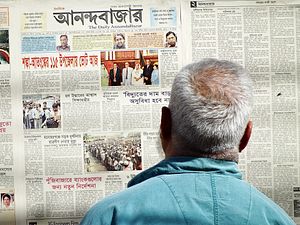Though the current secular government in Bangladesh speaks positively about press freedom in the country, the recent reality suggests things are not so rosy for journalists there.
Azmal Haque Helal, a senior journalist of a national daily, was sued under Section 57 of the Information and Communication Technology (ICT) Act on the night of July 6. The journalist, with a 32-year-long career thus far, expressed his frustration in an interview, saying that “Journalists never fear about jail or torture but [fear for] our family, our social prestige… We saw such black laws in former dictator General Ershad’s regime but facing similar laws under a democratic regime is unexpected and unbelievable.”
Helal is just the latest journalist to fall victim to Section 57. According to an investigation by The Daily Star, at least 21 journalists have been sued in 11 cases under Section 57 since March 1. Most of the cases are related to the journalists’ new reports. This has caused tension among right activists, bloggers, and intellectuals.
The Daily Star provided a rough translation of Section 57 (1):
If any person deliberately publishes or transmits or causes to be published or transmitted in the website or in any other electronic form any material which is false and obscene and if anymore sees, hears, or reads it [so that] having regard to all relevant circumstance, its effect is such as to influence the reader to become dishonest or corrupt, or causes to deteriorate or creates possibilities to deteriorate law and order, prejudice the image of the state or person, or causes to hurt or may hurt religious belief or instigate against any person or organization, then this activity will be regarded as an offense.
In one case, veteran journalist Probir Sikder was arrested in 2015 after posting a Facebook status expressing fear that his life was in danger and that a government minister, a businessman, and a fugitive war criminal would be responsible if he were killed. He named all of these three people in his post. Police took action against him instead of taking action against those he accused of threatening his life. A ruling party leader sued Sikder in Faridpur district under the ICT act for “tarnishing the image” of the minister. The case is still under trial.
The original ICT Act was enacted in 2006 by the Bangladesh Nationalist Party (BNP) and Jamaat-e-Islami alliance. In 2013, with the Awami League now in power, the government amended the law. The amendment increased the maximum punishment to 14 years in jail, up from 10 years and a fine of 10 million taka ($124,000). The amended law also empowered law enforcement to make arrests without a warrant. Previously, police had to seek permission from higher authorities to even file a case under the law.
Journalists and right activists have been critical of the Section 57 from the very beginning and the debate over the provision and demand for its repeal intensified following Sikder’s 2015 arrest.
Talking to The Daily Star, Reazuddin Ahmed, editor of The News Today, said, “Section 57 is a draconian law and it should be repealed as it goes against the spirit of press and freedom of expression.”
“The law minister had clearly said that the provision will be repealed. Yet, we saw a number of cases were filed against journalists and free thinkers. We regret and condemn this,” Reazuddin, who is also a former president of the Bangladesh Federal Union of Journalists, added.
After the widespread criticism and protests, Law Minister Anisul Haq said on July 9 that Section 57 would not be used to harassed journalists. “I have said it before and saying it again if any obstruction is created against freedom of speech or against journalists, the investigation officers or agencies will look into it,” Huq said.
His speech came after an inter-ministerial meeting at the Bangladesh Secretariat regarding a proposed Digital Security Act (DSA). The meeting included ministers from different ministries as well as representatives from law enforcement and intelligence agencies.
According to local media reports, participants said that Section 57 should be kept in place until the final enactment of the proposed Digital Security Act, suggesting that the relevant provisions of the ICT Act could be amended in the new law.
Huq told the media that the next meeting on the proposed DSA will be held in August. Until then, it will remain unclear whether Section 57 will have a place in the proposed new law – and so filing cases under the current ICT Act could continue.
According to The Daily Star, around 700 cases have been filed under Section 57 since 2013 and a total of 260 cases were filed till through the first week of June this year.
“No one will ever write or publish their though if this act exist; free speech will be disappear from this land,” said Helal.
Shakil Bin Mushtaq is a Bangladeshi journalist.

































